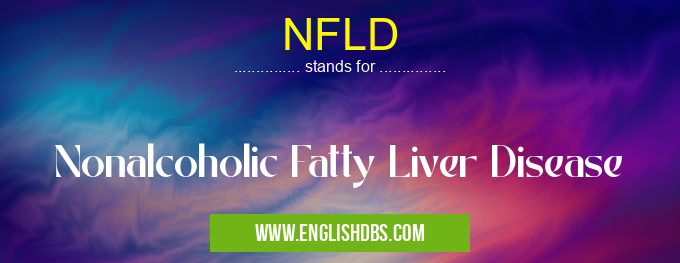What does NFLD mean in DISEASES
NFLD stands for Nonalcoholic Fatty Liver Disease. It is a condition in which excess fat builds up in the liver, causing inflammation and damage. NFLD is becoming increasingly common, affecting up to 25% of people worldwide.

NFLD meaning in Diseases in Medical
NFLD mostly used in an acronym Diseases in Category Medical that means Nonalcoholic Fatty Liver Disease
Shorthand: NFLD,
Full Form: Nonalcoholic Fatty Liver Disease
For more information of "Nonalcoholic Fatty Liver Disease", see the section below.
Causes of NFLD
The exact cause of NFLD is unknown, but certain factors are known to increase the risk of developing it, including:
- Obesity: People who are overweight or obese are at a higher risk of developing NFLD.
- Insulin Resistance: Insulin resistance, a condition in which the body doesn't respond properly to insulin, can lead to the build-up of fat in the liver.
- High Cholesterol: High levels of cholesterol in the blood can contribute to the development of NFLD.
- Type 2 Diabetes: People with type 2 diabetes are at an increased risk of developing NFLD.
- Genetics: Some people may be more genetically susceptible to developing NFLD.
Symptoms of NFLD
In its early stages, NFLD often does not cause any symptoms. However, as the condition progresses, symptoms may include:
- Fatigue
- Abdominal pain
- Nausea
- Jaundice (yellowing of the skin or eyes)
Complications of NFLD
If left untreated, NFLD can lead to serious complications, including:
- Cirrhosis: Cirrhosis is a condition in which the liver becomes scarred and damaged, leading to liver failure.
- Liver Cancer: NFLD is a major risk factor for liver cancer.
- Cardiovascular Disease: People with NFLD are at an increased risk of developing cardiovascular disease, such as heart disease and stroke.
Treatment for NFLD
There is no specific cure for NFLD, but treatment can help slow the progression of the disease and reduce the risk of complications. Treatment options include:
- Lifestyle Changes: Losing weight, eating a healthy diet, and exercising regularly can help improve liver function and reduce the risk of complications.
- Medications: Medications can be used to manage the underlying causes of NFLD, such as insulin resistance and high cholesterol.
- Surgery: In severe cases, surgery may be necessary to remove a portion of the liver.
Essential Questions and Answers on Nonalcoholic Fatty Liver Disease in "MEDICAL»DISEASES"
What is Nonalcoholic Fatty Liver Disease (NFLD)?
NFLD is a condition in which fat builds up in the liver, but not due to excessive alcohol consumption. It ranges from a mild condition with no symptoms to a more severe form that can lead to liver damage, scarring (cirrhosis), and even liver failure.
What causes NFLD?
The exact cause of NFLD is unknown, but it's associated with certain risk factors, including obesity, insulin resistance, type 2 diabetes, high cholesterol, and high blood pressure.
What are the symptoms of NFLD?
In its early stages, NFLD often has no noticeable symptoms. As it progresses, it can cause fatigue, abdominal pain, loss of appetite, and swelling in the legs and ankles.
How is NFLD diagnosed?
Diagnosis typically involves a physical exam, blood tests to assess liver function, and imaging tests such as ultrasound or MRI to visualize the liver.
What are the treatments for NFLD?
Treatment aims to reduce liver fat and prevent or slow disease progression. This may include weight loss, dietary changes, exercise, and medications to manage underlying conditions like diabetes or cholesterol. In severe cases, a liver transplant may be necessary.
Can NFLD be prevented?
While there is no guaranteed way to prevent NFLD, maintaining a healthy weight, eating a balanced diet, exercising regularly, and managing chronic conditions can help reduce the risk.
What is the prognosis for NFLD?
The prognosis depends on the severity of the disease. With early detection and treatment, most people with NFLD can manage their condition and prevent serious liver damage. However, in advanced cases, cirrhosis and liver failure can be fatal.
Final Words: NFLD is a serious condition that can lead to significant health problems. Early diagnosis and treatment are essential to prevent complications and improve outcomes. By understanding the risk factors, symptoms, and treatment options, individuals can take steps to reduce their risk of developing NFLD or manage the condition effectively.
